News
Learning Engineering Tools Competition
We are thrilled to announce that the ONPAR team is eligible to receive a prize from the 2021-2022 Learning Engineering Tools Competition. Our project was one of only 30 worldwide teams that is eligible to share $4 million in prizes to develop improved ed tech tools that will impact millions of students. This year, more than 800 teams from 60 countries competed for this rigorous competition. The proposals sought to accelerate literacy and math skills for K-12 students, transform assessments in cost and quality, facilitate faster, better, and cheaper learning science research, and improve adult learning to boost middle class wages. The educational tools developed by the winning teams have the potential to impact over 4 million learners by the end of 2022 and more than 40 million learners within the next three years, according to estimates calculated by each team. We could not be more excited to be among the winners working to address pressing issues in education and advance the field of learning engineering. A full list of winners, their projects, and awards can be found here: bit.ly/3xx9qdo
Assessment Pilot
The Institute is currently piloting interactive, classroom-embedded assessments in middle school science and mathematics. The assessments aim to be accessible to English learners and valid and reliable for all students. Funded by the U.S. Department of Education’s Institute of Education Sciences (IES), the Technology-interactive, Classroom-embedded Modules for Measuring Challenging Math and Science Skills of ELs is the IIA’s latest project in partnership with the Council of Great City Schools. If you are interested in joining the pilot, please contact us at iiainfo@wcer.wisc.edu.
IES Grant: Classroom-Embedded Modules
Funded by the U.S. Department of Education’s Institute of Education Sciences (IES), Technology-interactive, Classroom-embedded Modules for Measuring Challenging Math and Science Skills of ELs is the IIA’s latest project in partnership with the Council of Great City Schools. The project involves building interactive, classroom-embedded formative assessments in middle school science and mathematics that are aligned to new college and career readiness standards. The assessments aim to be accessible to English learners and valid and reliable for all students.
IES Grant Presentation
Rebecca Kopriva (PI) and Laura Wright (Project Manager) will present about the new IES-funded grant at the Council of Great City School's Fall Conference.
IIA's Kopriva (PI) and Carr Receive $1.6 Million from IES
 Rebecca Kopriva (PI) and Therese Carr (Project Manager) received $1,599,764 from IES for “Technology-interactive Classroom-embedded Modules for Measuring Challenging Math and Science Skills of ELs.” The project is building and testing a number of classroom-embedded tasks designed to measure math and science knowledge, skills, and abilities of English language learners in middle school classrooms. A structured abstract and further details on the grant are available on the IES website. The grant runs through June 2017.
Rebecca Kopriva (PI) and Therese Carr (Project Manager) received $1,599,764 from IES for “Technology-interactive Classroom-embedded Modules for Measuring Challenging Math and Science Skills of ELs.” The project is building and testing a number of classroom-embedded tasks designed to measure math and science knowledge, skills, and abilities of English language learners in middle school classrooms. A structured abstract and further details on the grant are available on the IES website. The grant runs through June 2017.
Kopriva to Present at AERA
 IIA Director Rebecca Kopriva to participate in AERA's Vice Presidential Invited Symposium: Technology Enhanced Items in Large Scale Assessments in Philadelphia, PA on April 7th. Kopriva will share her presentation, “Dynamic tasks that use novel response spaces and multi-layered, multi-semiotic techniques," at the symposium along with fellow invitees Wayne Camara (ACT), Ellen Strain-Seymour (Pearson), Randy Bennett (ETS),Jeremy Roschelle, and Terry Vendlinski (SRI International) , and Stephen Sireci (University of Massachusetts at Amherst).
IIA Director Rebecca Kopriva to participate in AERA's Vice Presidential Invited Symposium: Technology Enhanced Items in Large Scale Assessments in Philadelphia, PA on April 7th. Kopriva will share her presentation, “Dynamic tasks that use novel response spaces and multi-layered, multi-semiotic techniques," at the symposium along with fellow invitees Wayne Camara (ACT), Ellen Strain-Seymour (Pearson), Randy Bennett (ETS),Jeremy Roschelle, and Terry Vendlinski (SRI International) , and Stephen Sireci (University of Massachusetts at Amherst).
Kopriva and Carr Win Bridge Funding Award
 IIA researchers Rebecca Kopriva and Therese Carr win Bridge Funding Award from University of Wisconsin-Madison's School of Education in recognition of strong research and development track record. The funds are intended to support the Institute's ongoing work on developing and investigating interactive assessments.
IIA researchers Rebecca Kopriva and Therese Carr win Bridge Funding Award from University of Wisconsin-Madison's School of Education in recognition of strong research and development track record. The funds are intended to support the Institute's ongoing work on developing and investigating interactive assessments.
 IIA's Rebecca Kopriva and Therese Carr will present with WIDA at the TESOL 2014 Convention in Porland, OR. on March 28th.
IIA's Rebecca Kopriva and Therese Carr will present with WIDA at the TESOL 2014 Convention in Porland, OR. on March 28th.
Presentation Title |
Creative, Innovative, and Multimodal Standardized Assessments: An Update and Dialogue |
Session Summary |
Innovative assessments now under prototype provide text-alternative ways for English learners to demonstrate knowledge in content areas such as mathematics and science. Presenters preview and discuss multimodal, multisemiotic presentation of test questions (e.g., simulations, animations, image rollovers, sound, interactive sequences), along with other response means (graphic stories, diagrams, maps). |
Presenter |
Lynne Diaz-Rico ; Carsten Wilmes ; Therese Gleason Carr; Rebecca Kopriva ; Susan Daniels ; Tamara Reavis |
Interest Section |
No Specific Interest Section |
Content Area |
Assessment/Testing |
Room Number |
A109 |
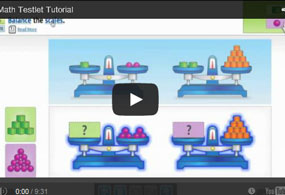 New!
New!
ONPAR tutorials are now available for both the Mathematics and Science Testlets. These tutorials demonstrate the ONPAR task types and help features of the testlets.
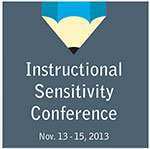 Rebecca Kopriva presents at the Instructional Sensitivity Conference at the University of Kansas.
Rebecca Kopriva presents at the Instructional Sensitivity Conference at the University of Kansas.
Rebecca Kopriva will delivered a presentation at the Instructional Sensitivity Conference at Kansas University in Lawrence, KS this November (2013) entitled Mixing it up to make the most out of tech-based techniques for at-risk students (and others too).
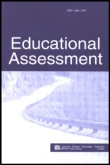 Therese Carr and Rebecca Kopriva coauthors on accessible item development article published in Journal of Educational Assessment.
Therese Carr and Rebecca Kopriva coauthors on accessible item development article published in Journal of Educational Assessment.
Institute researchers Therese Carr and Rebecca Kopriva collaborated with lead authors Stephanie Cawthon and Rachel Leppo on the (2013) article Towards accessible assessments: The promises and limitations of test item adaptations for students with disabilities and English language learners, published in Educational Assessment. Read the abstract below. Read the full paper.
Abstract
When do item adaptations veer from their intent and, instead of increasing access, modify the construct being measured? This study analyzed early elementary student achievement data from a statewide field test containing both standard and adapted science items. Four student groups were included in this analysis: English language learners, students with learning disabilities, students who are deaf or hard of hearing, and a control group of non–individualized education program native English speakers. This study included a qualitative evaluation of the items by experts with backgrounds in working with students with disabilities. Small sample sizes and restricted numbers of items available made generalizations of the results difficult, but findings suggest unexpected focal group differences in performance on the adapted items. The authors suggest that attention needs to be paid to whom items are adapted for, and steps need to be taken during item development to ensure that changes have the intended effect.
Citation
Cawthon, S., Leppo, R., Carr, T.G., & Kopriva, R.J. (2013). Towards accessible assessments: The promises and limitations of test item adaptations for students with disabilities and English language learners. Educational Assessment, 18(2), 73-98
 ONPAR science tasks presented at 2013 NASBE Eastern Regional Symposium on Standards– Next Generation Science Standards.
ONPAR science tasks presented at 2013 NASBE Eastern Regional Symposium on Standards– Next Generation Science Standards.
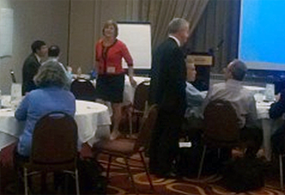 Institute researcher Therese Carr gave an invited presentation on the ONPAR approach to science assessment at the 2013 Eastern Regional Conference of the National Association of State Boards of Education (NASBE) Eastern Regional Symposium on the Next Generation Science Standards on September 20, 2013 in Pittsburgh, PA.
Institute researcher Therese Carr gave an invited presentation on the ONPAR approach to science assessment at the 2013 Eastern Regional Conference of the National Association of State Boards of Education (NASBE) Eastern Regional Symposium on the Next Generation Science Standards on September 20, 2013 in Pittsburgh, PA.
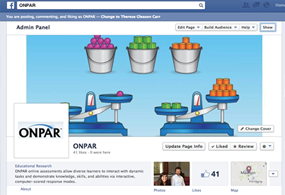 ONPAR Assessments Facebook Page Launched: Connect with Us!
ONPAR Assessments Facebook Page Launched: Connect with Us!
Join the conversation on innovative approaches to technology-delivered performance assessment by visiting our Facebook page. Leave your comments and feedback - we’d love to hear from you.



